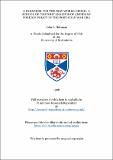A paradigm for the new world order : a school of thought analysis of American foreign policy in the post-Cold War era
Abstract
This thesis applies a schools of thought analysis to American foreign policy in the post-Cold War era. In chapter 1, it discusses what a schools of thought analysis involves and its usefulness as an analytical tool, with particular reference to Franz Schurmann's book, The Logic of World Power, an earlier attempt at an overarching review. In chapters 2-4, it classifies and analyses the specific schools of thought of American foreign policy in the post-Cold War era; the democratists, the neo-realists, and the institutionalists. It illustrates how general schools of thought predilections lead to policy preferences with reference to five issue areas in the post-Cold War era; US-Western European .relations, US-Russian relations, American initiatives in Bosnia, the MFN controversy with China, and the American position on regional and global trade pacts (Nafta and Gatt). It also classifies various opinion-makers in the overall schools of thought analysis by matching their specific policy preferences in the five issue areas to the general schools of thought positions. In chapter 5, it places individual administration and legislative decision-makers into the model, using the same techniques applied to the opinion-makers in chapters 2-4. In chapter 6, it uses schools of thought analysis as a template for analysing the Clinton administration's response to the Bosnian crisis, with particular reference to US-Russian relations and US- European relations. It identifies overall administration stances regarding these three areas by classifying White House initiatives using the schools of thought rubric. In chapter 7, having identified overall American foreign policy initiatives regarding Bosnia, Russia, and Western Europe and having placed individual political actors within the assessment, it is able, through the fusion of bureaucratic analysis and schools of thought analysis, to determine how specific policy inputs advocated by decision-makers partly due to their schools of thought orientation, lead to overall American foreign policy outputs. In chapter 8, it concludes by reassessing schools of thought analysis, both in relation to the Bosnian crisis and in general, and evaluating its worth as an analytical tool. This thesis represents an attempt to relate theory directly to political processes and specific policy-makers. By its use I am trying to both classify and analyse the intellectual and practical nature of the American foreign policy-making process in the post-Cold War era.
Type
Thesis, PhD Doctor of Philosophy
Collections
Items in the St Andrews Research Repository are protected by copyright, with all rights reserved, unless otherwise indicated.

